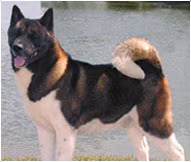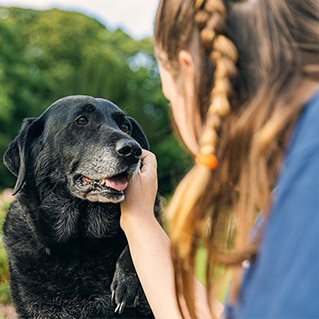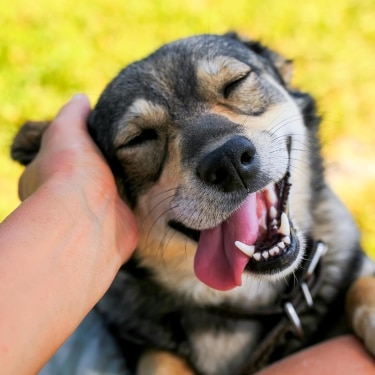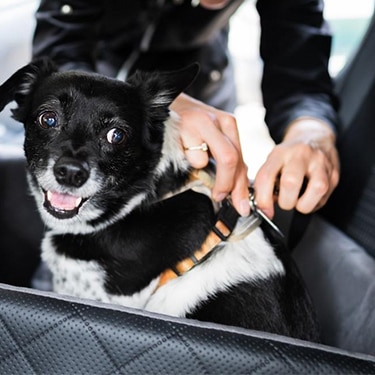The full, curled tail is proportionate with the large head. The male Akita stands between 26 and 28 inches and weighs about 110 pounds (50 kilograms). The female is between 24 and 26 inches and weighs about 80 pounds (36 kilograms). The broad chest and neck of the Akita serve as a solid base for the large head, the Akita's most distinguishing feature. The broad head and short muzzle form a blunt triangle when viewed from the top. The Akita has small eyes and erect ears, giving the breed a very dignified expression. The body is muscular and the legs are straight and strong. The tail is large and full, and carried high, usually curled over the body.
The coat of the Akita is short to medium in length and very dense. A thick, soft undercoat makes the Akita well suited to colder climates, although the coat will thin out considerably during warmer months. The outer coat, or guard hair, is slightly longer and coarser. Some Akitas have long hair, and although not correct for purposes of show, they are attractive dogs in their own right. Colors of the Akita include white, brindle and pinto. White Akitas have no mask. Pinto has a white background with large patches of color covering the body. The undercoat may be a different color from the outer coat, but the colors are always clear and bold. The striking appearance of the Akita has contributed to its steady growth in popularity.
The Akita was never bred to live or work in groups, rather to be alone or in a pair. Today's Akita reflects that breeding. The Akita is happy to be an only dog, and can be aggressive toward other dogs not in his family group. Properly socialized, an Akita can learn to tolerate other animals, but will most likely try to keep his status as top dog at any cost. The Akita is loyal and affectionate toward his family and friends, but quite territorial about his home and aloof with strangers. They are excellent watchdogs and will only bark when there is truly something amiss.
The large size of the Akita can make him difficult to control and so is not a breed suitable for everyone. He has extreme strength and endurance and needs dedicated training to help him properly channel energy. Being an intelligent breed, however, the Akita can easily become bored with training. He thrives when challenged and given a job to do.
Even though the Akita is a large, hardy breed, they have been bred for centuries as a companion in the home. The loyalty and devotion they display is well loved among Akita owners. Typically the Akita will follow you from room to room in your home, as if its only purpose in life is to protect you and keep you company. The Akita can, however, have aggressive tendencies. Usually the aggression is toward other dogs. They are not typically aggressive toward people, but have highly developed protection instincts and care should be taken when unfamiliar people enter your home. As for children in the home, the Akita will be as loyal toward them as any family member. Of course, young children in general should never be left alone with any large dogs, especially when they are new to the family.
In addition to their extreme loyalty, the Akita likes to keep very clean, and is easily housebroken. These two characteristics make them desirable to have in the home. Some have described the Akita as being almost "cat-like," as they are so clean and odorless.
The Akita originates in Japan where he is considered to be "tender in heart and strong in strength." The breed gets its name from the Prefecture of Akita, a section of northern Japan, where the breed was developed through crossings of chow chows with Japanese Kari and Tosa dogs. Centuries ago the breed was owned only by the imperial leaders of the country. Originally the Akita's job was to hunt, guard, and herd. This swift, powerful dog was unsurpassed in his ability to track large game including deer, elk and black bear. The Akita continues to be regarded as a loyal and courageous dog, and the Japanese now use the Akita as a police dog.
Known as a symbol of protection, Japanese parents often receive a small statue of an Akita when their child is born. The Akita is not only a symbol of protection, but also one of health, happiness, and long life. In 1931, the government of Japan declared the Akita breed to be a national monument and one of Japan's national treasures.
Helen Keller was the first person to bring the Akita to the United States. In 1937, on a visit to the Perfecture of Akita , she commented on how much she admired the breed and would like to have one of her own. Her courage had inspired the people of Japan, and as a gesture of respect she was given a puppy named Kamikaze-Go. Although this puppy died at a young age, she was fortunate to receive a second Akita and enjoyed his companionship for many years.
Adopt a pet. Change a life.
Are you prepared to adopt a pet? Use these tools to make sure you are ready for the commitment.
Adopt a pet. Change a life.
Are you prepared to adopt a pet? Use these tools to make sure you are ready for the commitment.






















